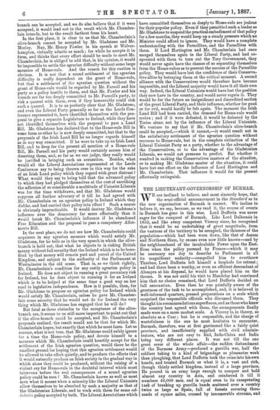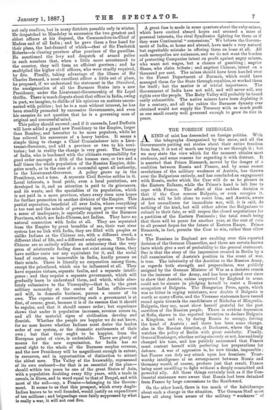THE LIEUTENANT-GOVERNORSHIP OF BURMAH.
WE are inclined to believe, and most sincerely hope, that the semi-official announcement in the Standard as to the new organisation of Burmah is correct. We incline to believe it, we say, because, as we read it, the course of events in Burmah has gone in this wise. Lord Dufferin was never eager for the conquest of Burmah. Like Lord Dalhousie in 1853, and like every competent Viceroy since, he recognised that it would be an undertaking of great magnitude, from the vastness of the territory to be occupied, the thinness of the population—which had been worn down, like that of Assam and Northern Siam, by causes even now little known—and by the neighbourhood of the incalculable Power upon the East. Even when the policy pursued by France—which it may be necessary one day to describe to Parliament in all its magnificent audacity—compelled him to overthrow Theebau, Lord Dufferin left himself a loophole for retreat ; and had there been a worthy, or even an efficient descendant of Alompra at his disposal, he would have placed him on the throne. It was not until his visit to Mandelay had convinced him that no choice remained, that Lord Dufferin decided on full annexation. Even then he was painfully aware of the greatness of the task to be accomplished, and, it is believed in well-informed quarters, pressed preparations on a scale which surprised the responsible officials who discussed them. They thought his recommendations superfluous, and as those who knew the country best agreed with them, the arrangements finally made were on a more modest scale. A Viceroy is, in theory, as absolute as a Czar ; but he is responsible, and the charge of wastefulness is the one he most hesitates to encounter. Burmah, therefore, was at first garrisoned like a fairly quiet province, and insufficiently supplied with civil adminis- trators, who are not easy to find, Indo-China and India being very different places. It was not till the one great error of the whole affair—the sudden disbandment of the Burmese Army—produced a guerilla war, half the soldiers taking to a kind of brigandage as pleasanter work than ploughing, that Lord Dufferin took the reins into his own hands, and treated Burmah as what it is, a vast and rich, though thinly settled kingdom, instead of a large province. He poured in an army large enough to conquer and hold almost any country in Asia, and reinforced it till it numbers 46,000 men, and is equal even to its exasperating task of breaking up guerilla bands scattered over a country twice as large as Spain, full of forests covering thou- sands of square miles, crossed by innumerable streams, and not only roadless, but in many districts passable only in winter. He despatched to Mandelay in succession the two greatest and ablest officers at his disposal, the Commanders-in-Chief of Madras and of all India ; and he gave them a free hand for their plans, the last-framed of which—that of Sir Frederick Roberts—is clearing province after province of the guerillas. He sanctioned the levy and despatch of armed police in such numbers that, when a little more accustomed to the country, they will form an efficient garrison ; and he multiplied the higher civil officers, who were cruelly required, by five. Finally, taking advantage of the illness of Sir Charles Bernard, a most excellent officer a little out of place, he proposed, if we understand the statement in the Standard, the amalgamation of all the Burmese States into a new Presidency, under the Lieutenant-Governorship of Sir Lepel Griffin. There is much dispute about that officer in India, owing in part, we imagine, to dislike of his opinions on matters uncon- nected with politics ; but he is a man without interest, he has been steadily promoted by successive Governments, and even his enemies do not question that he is a governing man of original and resourceful mind.
This policy should succeed ; and if it succeeds, Lord Dufferin will have added a grand new Presidency to the Empire, larger than Bombay, and hereafter to be more populous, while he has relieved his successors of a heavy burden. It seems a simple thing to change a Chief Commissioner into a Lieu- tenant-Governor, and add a province or two to his terri- tories ; but in reality the change is very great. The Viceroy of India, who is burdened with the ultimate responsibility for good order amongst a fifth of the human race, or two and a half times the whole population of the Russian Empire, dele- gates much, or in the case of a successful agent all authority, to the Lieutenant-Governor. A policy grows up in the Presidency, and a tone. A separate Civil Service settles in it. Local interests, a local pride, even a local patriotism, are developed in it, and an attention is paid to its grievances, and its wants, and the specialties of its population, which is not paid in a mere province, where every risen man hopes for further promotion in another division of the Empire. This partial separation, beneficial all over India, where everything is too vast and the minds of governing men grow weary with a sense of inadequacy, is especially required in the Burmese Provinces, which are Indo-Chinese, not Indian. They have no natural connection with India at all. They are separated from the Empire by great breadths of sea, their vast river system has no link with India, they are filled with peoples as unlike Indians as the Chinese are, with a different creed, a different ideal of life, and a different social system. The Indo- Chinese are so entirely without an aristocracy that the very germ of aristocratic feeling does not exist among them, they have neither caste nor any equivalent for it, and the social bond of custom, so immovable in India, hardly presses on their minds. There is literally no corporation among them, except the priesthood, which can be influenced at all. They have separate virtues, separate faults, and a separate intelli- gence ; and they require a separate government, which will gradually learn to understand them, and which, while abso- lutely submissive to the Viceroyalty—that is, to the great military monarchy at the centre of Indian affairs—can and will, in domestic business, pursue a course of its own. The expense of constructing such a government is at first, of course, great, because it is of its essence that it should be regular, and that it should ensure order ; but experience shows that under it population increases, revenue comes in, and all the material signs of civilisation develop and flourish. Whether the people are happier we do not know, for no man knows whether Indians most desire the leaden order of our system, or the dramatic excitements of their own ; but that they ought to be happier, from the
European point of view, is undeniable. There are plenty of
means for the new organisation, for India has no moral right to the whole of the Burmese surplus revenue, and the new Presidency will be magnificent enough in extent, in resources, and in opportunities of distinction to attract the ablest men. The Valley of the Irrawaddy, repossessed
of its own seaboard—for that is an essential of the plan—
should within ten years be one of the great States of Asia, with a population doubling every fifty years, with a trade in cereals, in fibres, and in wood equal to that of Bengal, and with most of the soil—say, a France—belonging to the Govern- ment. It seems to us that this prospect, which every Anglo- Indian knows to be well founded, would justify an expenditure of ten millions ; and brigandage once fairly suppressed by what is really a war, it will not cost five.
A great fuss is made in some quarters about the ruby-mines, which have excited absurd hopes and aroused a mass of personal interests, the rival Syndicates fighting for them as if they were Continental " concessions." We believe the Govern- ment of India, at home and abroad, have made a very natural but regrettable mistake in offering them on lease at all. All such monopolies are nuisances, and we do not want the burden of protecting Companies intent on profit against angry miners, who want not wages, but a chance of gambling ; angrier Shane, who claim tribute ; and angriest Chinese, intent on a thousand per cent. The mines should have been handed over to the Forest Department of Burmah, which could have managed them for the State through royalties, or worked them for itself ; but the matter is of trivial importance. The Government of India have not sold, and will never sell, any rights over the people. The Ruby Valley will probably be found easily exhaustible. The native miners have been depleting it for a century, and all the rubies the Burmese dynasty ever obtained would not supply the Treasury with as much profit as one small county well governed enough to grow its rice in, peace.















































 Previous page
Previous page